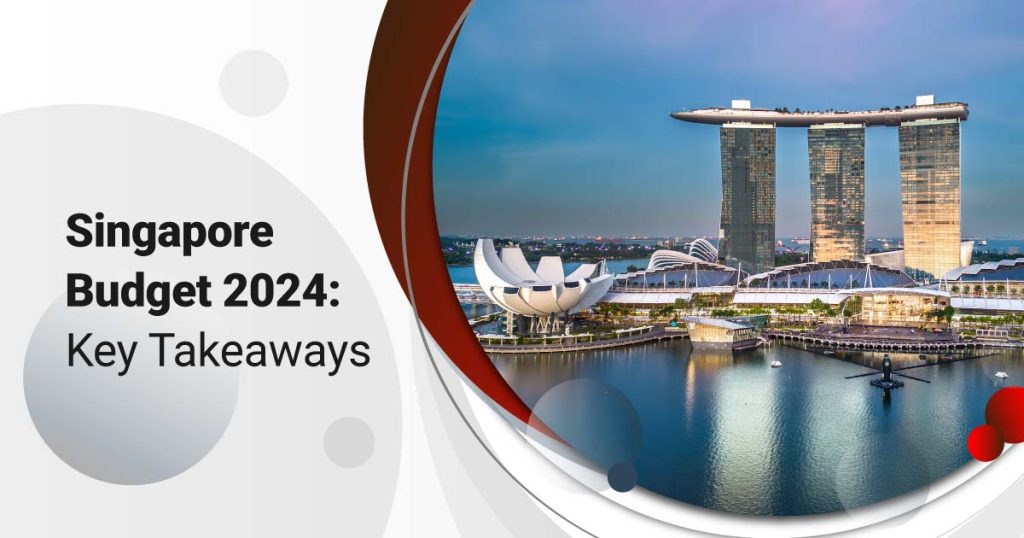 In this blog, we take a comprehensive look at these key measures, summarising what they detail and delving into how they can help companies in Singapore.
In this blog, we take a comprehensive look at these key measures, summarising what they detail and delving into how they can help companies in Singapore.
Greater Financial Support With the New Enterprise Support Package
The Enterprise Support Package is a new S$1.3 billion scheme that will support businesses in managing costs. It includes these components:- Corporate income tax rebate
- Enhancements to the Enterprise Financing Scheme (EFS)
- Extended SkillsFuture Credit
Corporate Income Tax Rebate
Companies will receive a 50% corporate income tax rebate capped at $40,000 for FY2024. There will also be a minimum benefit of S$2,000 in cash payouts for companies that employed at least 1 local employee in 2023. This payout will be automatically received by Q3 2024.What This Means for Companies
The tax rebate will reduce the tax liabilities of companies, support business growth, ease cash flow challenges, and stimulate economic activity. In particular, for small and medium enterprises (SMEs), this can provide much-needed liquidity to cover operational costs and investments in innovation. The minimum cash benefit underscores the value of local employment and provides a tangible reward for companies contributing to the local economy by hiring locally, offering some form of respite. This is particularly significant in the current climate, where businesses are navigating the complexities of recovery and growth amidst global uncertainties. It sends a clear message about the government’s commitment to business sustainability, workforce development, and community welfare.Enhancing Investment Attractiveness With the New Refundable Investment Credit (RIC)
The government recognises that high-quality investments have been a key driver for Singapore’s growth. Therefore, Minister Wong also introduced a new refundable investment credit (RIC) to boost the city-state’s investment attractiveness and competitiveness. The RIC motivates companies to inject substantial investments that bring an influx of substantive economic activities to Singapore in high-priority sectors and growth areas. It will support high-value and substantial economic activities such as:- Investment in new productive capacities, such as the production of low-carbon energy
- Performing R&D and innovative activities
- Implementing solutions with decarbonisation aims
- Expanding or setting up headquarter activities
- Widening or setting up the scope of activities in:
- Digital services
- Professional services
- Supply chain management
- Establishing or expanding activities via commodity trading firms
What Are Its Implications?
This investment credit scheme is a strategic solution and is expected to be a key enabler in driving global investments into Singapore. It will also be highly welcomed by potential investors and MNCs in Singapore that will be affected by BEPS 2.0 Pillar Two. Pillar Two features a minimum effective tax rate of 15%, which Singapore is implementing in 2025. The key worry is that Singapore can no longer use tax incentives as a carrot to attract mid-to-large MNCs to invest in Singapore. InCorp views the new RIC as a key counter tool adopted by the government to continue to attract large MNCs to set up international headquarters and move R&D and high-tech manufacturing in Singapore, providing them with certainty to map out their business strategies going forward, in the absence of tax incentives as the main attraction. Singapore will be able to make its way up the value chain and remain globally relevant, boost innovation and productivity, and move ahead in the green transition.Prioritising Investments in R&D, Finance, Clean Energy, and AI
 Minister Wong also announced the allocation of resources to strengthen sectors where Singapore has a competitive edge. Investments of more than S$11 billion will be poured into national research and development (R&D) efforts, as well as finance, clean energy, and artificial intelligence (AI) sectors.
S$3 billion will be allocated to R&D through the Research, Innovation and Enterprise (RIE) 2025 plan that was first introduced in 2020.
Another S$2 billion will be used to top up the Financial Sector Development Fund to fortify Singapore’s dominance, giving the Monetary Authority of Singapore (MAS) additional resources to extend its lead in the industry.
Acknowledging that AI is key to driving more economic growth, the government will also add S$1 billion to AI development over the next 5 years to grow the AI talent pool and obtain access to advanced chips that support the increasing use of AI.
Minister Wong also announced the allocation of resources to strengthen sectors where Singapore has a competitive edge. Investments of more than S$11 billion will be poured into national research and development (R&D) efforts, as well as finance, clean energy, and artificial intelligence (AI) sectors.
S$3 billion will be allocated to R&D through the Research, Innovation and Enterprise (RIE) 2025 plan that was first introduced in 2020.
Another S$2 billion will be used to top up the Financial Sector Development Fund to fortify Singapore’s dominance, giving the Monetary Authority of Singapore (MAS) additional resources to extend its lead in the industry.
Acknowledging that AI is key to driving more economic growth, the government will also add S$1 billion to AI development over the next 5 years to grow the AI talent pool and obtain access to advanced chips that support the increasing use of AI.
What Does This Mean?
InCorp views this as a message that Singapore is sending out to the world to drive new frontier, up-and-coming investment themes into Singapore to propel it forward in the years to come. This is key for the country, with a lack of natural resources we need to keep abreast with the latest trends in the world. AI-wise, collaborating with industry leaders to erect AI Centres of Excellence will also encourage innovation, draw in global expertise, and build partnerships to create a strong ecosystem. The investment will help to speed up the upskilling of local talent to achieve the vision set out in the National AI Strategy 2.0.Giving the Go-Ahead for Growth of Singapore
The Singapore Budget 2024 lays down a robust and promising framework for long-term growth and innovation as the first tranche of the Forward Singapore pillars. It invites us to leverage these opportunities to enhance our competitive edge, especially in areas like AI and future energy sectors. However, as we navigate these opportunities, the emphasis must be on practical, accessible, and targeted support that enables SMEs to translate these initiatives into tangible benefits for our businesses and the broader economy. If you are considering expanding your company to Singapore, the Budget is a snapshot of the nation’s unwavering dedication to fostering a competitive, innovative, and sustainable business system.Contact our team
Posts not found!
FAQs About Singapore Budget 2024
How does Budget 2024 help businesses in Singapore?
- The Singapore Budget 2024 offers a variety of supportive schemes that covers most stakeholders and businesses. Some of these include:
- The new Enterprise Support Package
- The new Refundable Investment Credit (RIC)
- S$11 billion investments in key competitive areas like R&D
What are some of the Singapore Budget 2024 highlights?
- It features plenty of schemes designed at supporting various sectors, such as billion-dollar investments and tax incentives.
When was the Singapore Budget announcement made?
- It was made on 16 February 2024 by Deputy Prime Minister and Minister for Finance Lawrence Wong.


